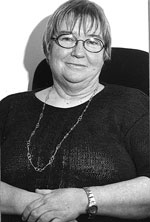By Mary Reinholz
Stewart’s trial on charges of aiding and abetting international terrorism is expected to begin on June 21 at the federal courthouse on Foley Square after a month-long jury selection process. The jurors’ names will remain anonymous.
Much of the U.S. Justice Department’s evidence against Stewart is from secretly monitored conversations with the blind sheikh, a Muslim cleric, at a prison hospital facility in Minnesota starting in 2000. He has been represented by former U.S. Attorney Ramsey Clarke, but Clarke was not present at the May 11 conference, said a source close to the case.
Stewart, who represented the sheikh at his 1994 trial, faces charges under a second superseding indictment by a federal grand jury last November. She is accused of distracting prison guards to help Abdel Rahman pass messages to members of a federally designated terrorist organization in Egypt, the Islamic Group, to advance an international criminal plot aimed at winning his release from prison.
She has acknowledged issuing a press release to Reuters in Cairo on behalf of the shiekh and was originally scheduled to stand trial Jan. 12 on lesser counts from her 2002 indictment after Judge Koeltl dismissed two of the most serious charges against her on July 22, 2003. But the trial date was pushed back after the reframed “superseding” indictment against Stewart and two other defendants under different statutes. Judge Koeltl allowed all five counts in the current indictment to stand for trial and granted the government’s motion for anonymous jurors, said the silver haired Stewart, now 64, during a May 6 gathering at the Religious Society of Friends’ Meeting house on E. 15th St.
According to Stewart, the government has also sought in pre-trial motions to limit defense references to her “being a grandmother” of 10 and her “frumpy” attire at trial, which she expects to last past the summer. “I think they must have heard me say that when The New York Times described me as having wrinkled clothes and uncombed hair, that every woman in New York would say: ‘I’m with her,’ “ she said as her supporters chuckled during her remarks at the Quaker meeting house. Koeltl has yet to rule on these motions.
Washington, D. C. lawyer Michael E. Tigar is representing Stewart, who has pleaded not guilty to all charges against her in both indictments, including allegations that she broke jail house rules in her communications with the shiekkh, who is serving a life sentence plus 65 years for conspiracy to blow up the World Trade Center and other New York landmarks in 1993.
There can be little doubt that the government is zealously seeking to win a conviction of Stewart. Assistant U.S. Attorney Robin L. Baker, one of the government prosecutors in the New York U.S. Attorney’s Office, declined to answer questions about her attempts and that of a colleague, Anthony S. Barkow, to obtain the unpublished outtakes, notes or tapes from a 2002 online interview with Stewart conducted by writer/producer Bill Weinberg, who is also a weekly host for WBAI on on a program called “Moorish Orthodox Radio Crusade.” Weinberg’s lengthy interview with Stewart appeared in his June 30, 2002, online World War 3 Report, which is now his monthly newsletter.
“I asked her a lot of tough questions which I believe every journalist has an obligation to do,” recalled Weinberg, 42, who received a letter by Federal Express from the U.S. Attorney’s office, Southern District, dated Nov. 14, 2003— just five days before Stewart was hit with the aforesaid superseding indictment. In it, Baker and Barkow ask that Weinberg voluntarily turn over his interview materials and also asked him to serve as a witness at Stewart’s trial because “the Government is seeking to introduce into evidence certain statements reported in your publication.”
The government’s letter, which was signed by then New York Attorney General James B. Comey, now a deputy U.S. Attorney directly reporting to John Ashcroft, goes on to note: “If you do not comply voluntarily, this Office may seek approval from the Attorney General for the issuance of a subpoena to compel you to produce the materials and testify.”
Weinberg, who refused through his attorney to accede to the government’s request, acknowledged that the letter was “frightening and unpleasant,” but noted: “I haven’t heard from them. I believe they should choose to respect my rights as a journalist and respect the First Amendment.”
Weinberg’s attorney, Martin Stolar, who has a practice on lower Broadway directly above Stewart’s law office and is also New York City president of the National Lawyers Guild, said he wrote the U.S. Attorney and said approximately: “We’re not going to voluntarily provide anything” to the government in its case against Stewart. He said there had been no response and noted it would be difficult for federal prosecutors to compel Weinberg to act as a witness in any event: “There are U.S. Justice Department guidelines about subpoenaing journalists and they would have to go through some hoops.”
Stolar noted that journalists are not subpoenaed and asked to cooperate that often in cases, “because most people are aware that journalists don’t like to be witnesses.” Marvin Smilon of the U.S. Attorney’s Office in New York had no comment on the matter.




























